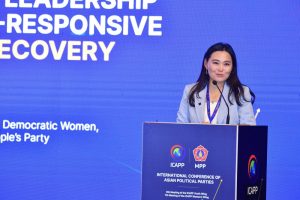The seventh annual meeting of the International Conference on Asian Party Politics (ICAPP) Women’s Wing was convened in Ulaanbaatar, Mongolia from August 4-7. The ICAPP Women’s Wing, having been canceled for two years in a row due to COVID-19, is still catching up on addressing gender equality issues within party politics as societies rebuild from the pandemic.
This year’s agenda for the ICAPP’s Women’s Wing was “Promoting Women’s Leadership to Achieve a Gender-Responsive Post-Pandemic Recovery.” Representatives of 28 political parties from 21 countries, including women in leadership positions, attended. The conference aimed to address two major issues: How do we make women’s leadership in government positions the social norm rather than the exception? And how can the women in leadership positions ensure equality for women and girls?
This was the first time Mongolia has hosted an ICAPP event. Mongolia signed an MoU of cooperation with ICAPP in 2016. Today, both of Mongolia’s largest political parties – the Mongolian People’s Party and Democratic Party – are members in ICAPP. This year, Nomin Chinbat, the Mongolian minister of culture, was appointed as the chair of the ICAPP Women’s Wing.
The ICAPP’s Women’s Wing – which marks its 10th anniversary this year – focused on creating a network of female politicians and other interested bodies to advance the cause of gender equality in the region. Mongolia’s effort to host this event aligns with its broader advancement of a feminist foreign policy, including hosting a Female Foreign Ministers’ Meeting in July.
Ulaanbaatar’s hosting of the ICAPP Women’s Wing brought attendees from Bangladesh, China, Laos, Indonesia, Iraq, Georgia, Malaysia, Myanmar, Nepal, Pakistan, the Philippines, Russia, South Korea, Sri Lanka, Thailand, Turkey, and Vietnam. Moreover, this year’s conference was commenced under a larger umbrella than ICAPP proper, including political party representatives from Ghana and Spain.
From a governance perspective, Mongolia’s active participation in international gatherings such as the ICAPP community can help further democratic practices, implement gender-responsive social policies, and address common challenges. ICAPP, which gathers leaders from all political parties with a broad range of ideologies and nationalities, has become a positive force for Mongolia to be involved in.
Opening the 2023 ICAPP Women’s Wing, Nomin echoed this view: “The disruption we have experienced during the pandemic has exposed the true scale of the challenges we need to overcome. But it has not diminished our ability to build a more prosperous and inclusive society, and only strengthened our will to do so.”
While Mongolia has been focusing more on gender equality in recent years, it has swung back and forth on the issue in the past. Dr. Mandukhai Buyandelger, a social anthropologist at the Massachusetts Institute of Technology, analyzed the challenges Mongolian female politicians face in her book “A Thousand Steps to Parliament.” She highlighted different administrations’ abrupt but strategic decisions to repeal the 30 percent women candidate quota in the 2008 election. These changes imposed additional challenges for women to have a parliamentary seat.
In May, the Mongolian parliament passed a major constitutional reform that enlarged its legislative branch from 76 parliamentary members to 126. The new election law reintroduced the 30 percent women’s quota in the 2024 parliamentary election. The new election law, in a way, will force parties to include female candidates.
It may already be having an effect. During the ICAPP meeting, a board member of the HUN Party promised that the party will nominate a female politician for mayor in 2024.
According to the Global Data on National Parliaments, Mongolia ranked 135th in the proportion of female lawmakers as of 2020 – electing 13 female candidates out of 76 seats, which equates to 17.1 percent female representation in parliament. However, if Mongolia were to secure 30 percent of female representatives in the next parliamentary elections, Mongolia would immediately enter the top five countries for women’s representation in Asia.
While the government of Mongolia is hopeful for such a major swing, party politics experts and analysts have highlighted plausible challenges during the implementation process, especially in meeting the women’s quota.
Nomin explained the importance of the effort in her remarks at the ICAPP Women’s Wing: “During the prolonged pandemic, there were only 13 senior decision-making women in the world. These women were able burst through barriers and rally their countries through the pandemic, often earning global plaudits. They demonstrated the value of female leadership to the world and paved the way for more to follow.”
The gathering of the ICAPP Women’s Wing bestows an opportunity to reconnect, regroup, and reignite female leaders, policymakers, social workers, and party representatives to work toward a shared common goal in the face of a vastly different global landscape. Ulaanbaatar’s hosting of the international gathering not only illustrates the government’s active role in regional and international dialogues on equality but also provides an excellent opportunity to listen, learn, and adopt the working mechanisms of other leaders and fix their own missteps.

































